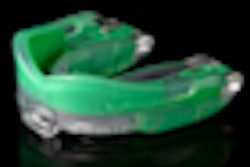
NEW YORK (Reuters Health), Jun 13 - Wearing a mouthguard does not seem to interfere with athletes' performance, at least when the device is custom-fit, a small study suggests.
The American Dental Association and other medical groups suggest mouthguards be used in any sport where chipped teeth, jawbone fractures, and other facial injuries are a risk. That includes sports that are generally seen as noncontact, such as basketball and soccer -- where collisions with other players commonly result in facial injuries.
But studies have found that in sports that do not mandate mouthguard use, few athletes opt to use them. A major obstacle is players' fear that the device will interfere with their breathing and speaking, and ultimately detract from their game.
In the new study, published in the International Journal of Sports Medicine, Swiss researchers outfitted 13 elite-level ice hockey players and handball players with custom-fit mouthguards.
They found that while the athletes at first complained of some problems with speaking, breathing, and performance, they became much more comfortable with the mouthguards after a few weeks.
Moreover, during exercise tests on a stationary bike, the men performed as well while wearing the mouthguard as they did without it.
"Many athletes fear that wearing a mouthguard would interfere with their exercise capacity," said lead researcher Dr. Thomas von Arx from the University of Bern.
The current findings, he told Reuters Health, suggest those worries are unfounded.
However, von Arx also stressed the importance of using custom-fit mouthguards, which are made by a dentist to conform to an individual's teeth and gums.
"Mouthguards should not be purchased over-the-counter," he advised.
Such "stock," or one-size-fits-all, mouthguards are inexpensive, but they are less comfortable than customized guards. A stock mouthguard also requires the athlete to bite down to keep it in place, which can make breathing more difficult.
By Amy Norton
Source: International Journal of Sports Medicine, May 2008.
Last Updated: 2008-06-13 13:00:16 -0400 (Reuters Health)
Copyright © 2008 Reuters Limited. All rights reserved. Republication or redistribution of Reuters content, including by framing or similar means, is expressly prohibited without the prior written consent of Reuters. Reuters shall not be liable for any errors or delays in the content, or for any actions taken in reliance thereon. Reuters and the Reuters sphere logo are registered trademarks and trademarks of the Reuters group of companies around the world.



















